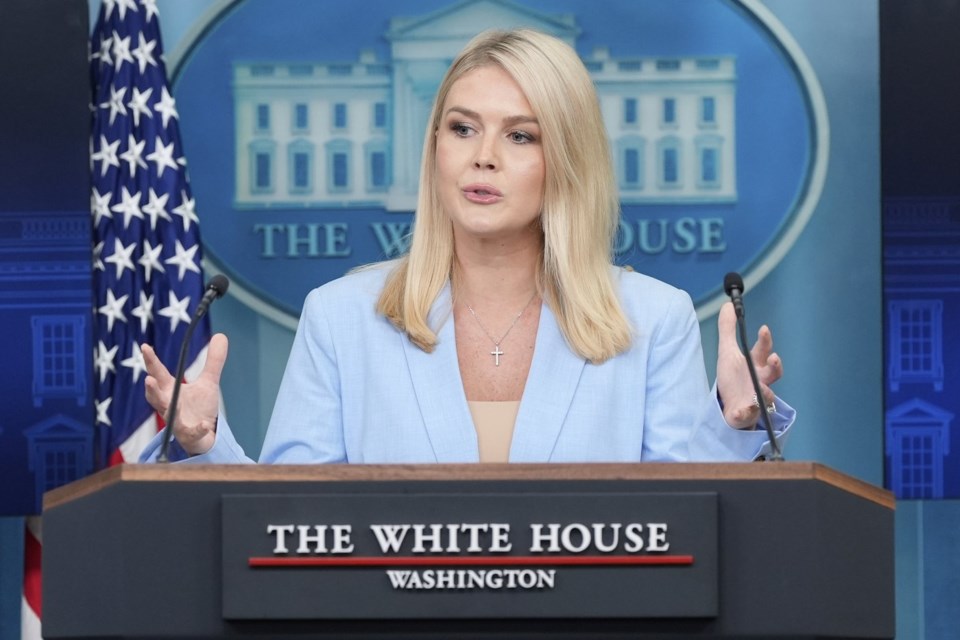WASHINGTON — The White House on Friday downplayed the North American automobile industry's claim that U.S. President Donald Trump's new trade deal with the United Kingdom could make the sector less competitive.
"The idea that an American buyer can now import a Jaguar for less than a Dodge Charger is everything that is wrong with the Trump tariff war on cars," said Flavio Volpe, president of the Automotive Parts Manufacturers' Association in Canada.
The preliminary trade deal with the U.K. announced on Thursday came at a critical time for the Trump administration, as its polling numbers slide and as Americans grow more concerned about rising prices and markets in turmoil.
While the agreement has not been finalized and many details remain unclear, it sent shockwaves across a North American automobile industry already reeling from Trump's tariffs.
American Automotive Policy Council President Matt Blunt said Thursday that "it will now be cheaper to import a U.K. vehicle with very little U.S. content" than to bring in a vehicle from Canada or Mexico that complies with the Canada-U.S.-Mexico Agreement on trade and is half-constructed from American parts.
The council represents the Big Three automakers — Ford, General Motors and Stellantis — which have spent months pressing the Trump administration to drop tariffs.
"We hope this preferential access for U.K. vehicles over North American ones does not set a precedent for future negotiations with Asian and European competitors," Blunt said in a media statement.
When asked about the automobile industry's concerns on Friday, White House Press Secretary Karoline Leavitt said the president "wants to put them on the best pedestal to compete." She said if they want to avoid tariffs, they should build their products completely in America.
"I would argue, of any industry, the president has spent more time talking to and listening to the concerns of our auto industry here at home. He hears them. He believes in them," she said. "He wants to see them produce their vehicles here in the United States of America. This is a good deal for them, too."
The Canada-U.S.-Mexico Agreement, also called CUSMA, was negotiated during the first Trump administration and included boosted supports for the North American automobile industry. The industry is now being assaulted on all fronts by the president's tariff regime.
Trump slapped a 25 per cent tariff on all vehicle imports to the United States last month, but later ordered a partial carve-out for vehicles from Canada and Mexico compliant with CUSMA. Those cars only are hit with duties on their non-American components.
The North American automobile sector is deeply integrated and vehicles cross borders multiple times before completion. Experts say most vehicles finished in Canada are made with more than 50 per cent American parts.
After the automotive companies publicly warned that the tariffs would cost them billions of dollars, raise costs for consumers and upend businesses, Trump provided small measures of relief earlier this month, including an order excluding CUSMA-compliant auto parts from the tariffs.
The U.K. trade deal has many in the auto sector worried that the Trump administration's dash to make deals with dozens of other countries could further erode the continental auto industry.
"It's incomprehensible that the United States would strike a trade agreement with the U.K. that provides U.K.-manufactured vehicles with preferential access to the U.S. market over Canada," said Brian Kingston, president and CEO of the Canadian Vehicle Manufacturers' Association.
"We have been building vehicles together for 60 years. We have an existing trade agreement … and the majority of the parts and components in a Canadian-produced vehicle are in fact American."
Kingston said Ottawa must act quickly to get the Trump administration to the table to talk about CUSMA and the integrated North American auto industry — and can't afford to wait while Washington makes deals with other countries.
Leavitt did not rule out lower tariffs on vehicles for other countries but said "all of these deals are going to be tailor-made."
Trump launched, then partially paused, his trade war with the world through "reciprocal" tariffs in April. A 10 per cent universal tariff is in place for most countries, while Trump slapped Chinese imports with a 145 per cent duty.
Trump has said the 90-day pause was meant to allow time to negotiate trade deals — but the United Kingdom's preliminary agreement was the first such announcement. Trump claimed on social media Thursday that he has "Many Trade Deals in the hopper, all good (GREAT!) ones!"
— With files from Kyle Duggan in Ottawa
This report by The Canadian Press was first published May 9, 2025.
Kelly Geraldine Malone, The Canadian Press




